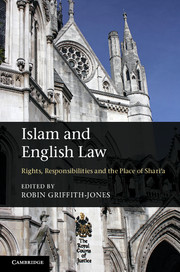Book contents
- Frontmatter
- Contents
- List of contributors
- List of abbreviations
- Preface
- Introduction
- Part I The Archbishop of Canterbury and shariʽa law
- Part II The Archbishop’s proposal for ‘transformative accommodation’
- Shariʽa and secular democracy: is Islamic law compatible with the European Convention on Human Rights?
- 3 The Refah case at the European Court of Human Rights
- 4 The compatibility of an Islamic/shariʽa law system or shariʽa rules with the European Convention on Human Rights
- 5 An analysis of the relationship between shariʽa and secular democracy and the compatibility of Islamic law with the European Convention on Human Rights
- 6 Dignity and religion
- Legal pluralism: should English law give greater recognition to Islamic law?
- Accommodation or conflict: trajectories in the United Kingdom
- Part III Responsibilities and rights
- Part IV Prospect: equality before God and before the law
- Select bibliography
- Index of cases
- Index
- References
6 - Dignity and religion
Published online by Cambridge University Press: 05 April 2013
- Frontmatter
- Contents
- List of contributors
- List of abbreviations
- Preface
- Introduction
- Part I The Archbishop of Canterbury and shariʽa law
- Part II The Archbishop’s proposal for ‘transformative accommodation’
- Shariʽa and secular democracy: is Islamic law compatible with the European Convention on Human Rights?
- 3 The Refah case at the European Court of Human Rights
- 4 The compatibility of an Islamic/shariʽa law system or shariʽa rules with the European Convention on Human Rights
- 5 An analysis of the relationship between shariʽa and secular democracy and the compatibility of Islamic law with the European Convention on Human Rights
- 6 Dignity and religion
- Legal pluralism: should English law give greater recognition to Islamic law?
- Accommodation or conflict: trajectories in the United Kingdom
- Part III Responsibilities and rights
- Part IV Prospect: equality before God and before the law
- Select bibliography
- Index of cases
- Index
- References
Summary
The chapters in this section of the book have analysed the current debates over the approach taken by the European Court of Human Rights (ECtHR) in the Refah case, and to some extent in the Sahin case. A key, but seldom identified, future problem in the interpretation of the European Convention on Human Rights (ECHR) in the context of Islam and Muslim religious practices and beliefs is the problematic role of the concept of ‘dignity’ in that debate. The ECtHR has failed to articulate an understanding of dignity that comes close to being persuasive, yet British courts rely on this ‘thin’ conception as a central plank in their current approach to examining the compatibility of some manifestations of religious beliefs with the ECHR, and Islam may be significantly affected by this in the future.
To be protected by the ECHR, beliefs must be ‘worthy of respect in a democratic society and … not incompatible with human dignity’. The ECtHR has struggled with cases involving claimants’ religious beliefs that may be seen to adopt a view of women’s proper role and behaviour that differs from that of Western society. There is a danger here of creating human rights outlaws. But as Lord Walker has said, ‘in matters of human rights the court should not show liberal tolerance only to tolerant liberals’. There is a basis for more than mere tolerance: in due recognition of the dignity of both parties to the case.
- Type
- Chapter
- Information
- Islam and English LawRights, Responsibilities and the Place of Shari'a, pp. 94 - 106Publisher: Cambridge University PressPrint publication year: 2013
References
- 2
- Cited by

